 The square of the difference of two numbers is equal to the square of the first, minus twice the product of the first and the second, plus the square of the second. The square of the difference of two numbers is equal to the square of the first, minus twice the product of the first and the second, plus the square of the second.  Elements of Algebra - Page 40by Arthur Schultze - 1918 - 309 pagesFull view Elements of Algebra - Page 40by Arthur Schultze - 1918 - 309 pagesFull view - About this book
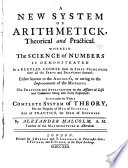 | Alexander Malcolm - Algebra - 1730 - 702 pages
...one of them • and the Product of thé other into the Sum of this other and double the former. Alfo the Square of the Difference of two Numbers is equal to the Difference of the Square of one of them, and the Product of the other into, the Difference of this... | |
 | Richard W. Green - Algebra - 1839 - 156 pages
...multiply their difference, by their difference. a—b a—b a3 — ab —ab+b3 a3— 2ab+b3 Therefore, the square of the difference of two numbers, is equal to the square of the first number, minus twice the product of the two numbers, plus the square of the second. §174. The only... | |
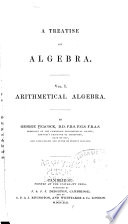 | George Peacock - Algebra - 1842 - 426 pages
...whatsoever. The square 64. To form the square of a - b. ofa-b. a - b a -ft a8- ah - ab + b* = (a Or the square of the difference of two numbers is equal to the excess of the sum of the squares of those numbers above twice their product. Thus, ( 5-S)* = 2* = 4=... | |
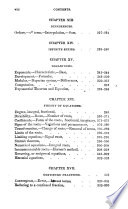 | Stephen Chase - Algebra - 1849 - 348 pages
...have, (a+(— J)) 3= (a— b) 2= a2+2a(— J)+(— b) 2 —a2—Zab +fi3 [§ 11. N. 2.]. Hence, THEOR. II. The square of the difference of two numbers is equal to the sum of their squares, MINUS twice their product. See Geom. § 183. Cor. vu. Multiply a — b by a —... | |
 | G. Ainsworth - 1854 - 216 pages
...equal to the sum of their squares, plus twice their product. III. (a— b)2=ai— Zab + b2 ; that is, The square of the difference of two numbers is equal to the sum of their squares, minus twice their product. IV. (a+b)2— (a — 6)^=4aJ ; that is, The square... | |
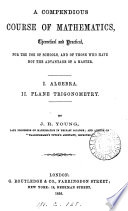 | John Radford Young - 1855 - 218 pages
...the sum of two numbers is equal to the squares of the numbers themselves plus twice their product. 2. The square of the difference of two numbers is equal to the squares of the numbers themselves minus twice their product. * In examples like (6), (7), and (8),... | |
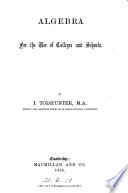 | Isaac Todhunter - Algebra - 1858 - 530 pages
...to tlie sum of the squares of the two numbers increased. by twice their product. Again we have, Thus the square of the difference of two numbers is equal to the sum of the squares of the two numbers diminished by twice their product. Also we have (а + b)(ab)... | |
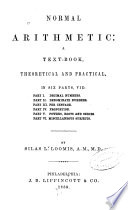 | Silas Lawrence Loomis - Arithmetic - 1859 - 324 pages
...root ihould be carefully compared, in every particular, before proceeding further. 357. PRIN. 3. — THE SQUARE OF THE DIFFERENCE OF TWO NUMBERS, IS EQUAL TO THE SQUARE OF THE FIRST, MINUS TWICE THE PRODUCT OF THE FIRST BY THE SECOND, PLUS THE SQUARE OF THE SECOND. ILLUSTRATION 1 . — Required... | |
 | Isaac Todhunter - Algebra - 1863 - 302 pages
...the squares of the two numbers increased by twice their product. Again, the second example gives Thus the square of the difference of two numbers is equal to the sum• of the squares of the two numbers diminished by twice their product. The last example gives... | |
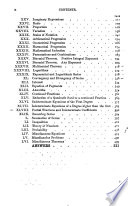 | Isaac Todhunter - Algebra - 1866 - 580 pages
...tJte siim, of the squares of the two numbers increased by twice their product. • Again we have Thus the square of the difference of two numbers is equal to the sum of the squares of the two numbers diminished by twice their product. Abo we have (a + b)(ab) =... | |
| |